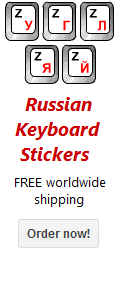 FR FR |
About us | Home | User agreement | Link to us |
The Russian Infinitive
Every changeable Russian word has the initial form. For example, the nominative singular form is initial for nouns (студе́нт - student). The infinitive is the initial form of verbs (люби́ть - to love).
The infinitive is a specific verb form that answers such questions as "что де́лать?" (чита́ть, писа́ть) and "что сде́лать?" (прочита́ть, написа́ть). The infinitive only designates an action or condition but does not indicates tense, person or number. Therefore all dictionaries give Russian verbs in the infinitive form.
Note: The infinitive is an unchangeable verb form.
The infinitive form of most of Russian verbs ends in -ть or -ти. These endings are called suffixes of the infinitive (строить, вести). Some infinitive forms end in -чь that is not a suffix but a part of the (). The part of a word without the suffix -ть or -ти comprises the stem (веселить, плести).
Using the Russian Infinitive
In Russian language, the infinitive is used in the following situations:
- To construct compound future tense
- In conjunction with the present tense verbs to designate the beginning, continuation or ending of an action
- In combination with the words до́лжен (must), рад (glad), гото́в (ready), обя́зан (obliged), наме́рен (intended)
- In combination with adverbs and adjectives
- In combination with such verbs of motion as идти́ (to go by foot), ходи́ть (to walk), е́здить (to go by vehicle), лете́ть (to fly), пое́хать (to go by vehicle)
Мы бу́дем рабо́тать.
(We shall work.)
Мы на́чали разгова́ривать.
(We have started talking.)
Он продо́лжил рабо́тать.
(He continued to work.)
Она́ ко́нчила чита́ть.
(She finished reading.)
Мы гото́вы встре́тить госте́й.
(We are ready to meet the guests.)
Вам ну́жно прие́хать.
(You need to come.)
Им не́куда пое́хать.
(They have nowhere to go.)
Мы пое́хали ката́ться на лы́жах.
(We went skiing.)
Note: The infinitive is never used with the verb зна́ть (to know).
Test yourself
A. Which of the following proverbs uses the infinitive form of the verb?
- 1. Со сча́стьем хорошо́ и по грибы́ ходи́ть.
- 2. У кого́ мно́го дел вперёд, тот наза́д не огля́дывается.
B. Which of the following is characteristic of the infinitive form of the Russian verb?
- 1. shows tense
- 2. shows aspect
- 3. designates action
- 4. none of the above
C. Which sentence uses the infinitive in combination with a verb of motion.
- 1. Комар летит трубить свою победу по лесам.
- 2. Спешить -- дело губить.
- 3. Жизнь прожить -- не поле перейти.
Check answers
- A. 1, B. 3, C. 1 ("дело", "жизнь", "поле" are nouns)
Got questions?
Ask them in the Russian Questions and Answers — a place for students, teachers and native Russian speakers to discuss Russian grammar, vocabulary, pronunciation, and other aspects of the Russian language.
Copyright 2001-2026 MasterRussian.com | Privacy Policy | Contact Us
 Russian Lessons
Russian Lessons
- Russian alphabet
- Names of letters
- Russian Q&A new
- Pronunciation: Cons.
- Pronunciation: Vowels
- Noun Gender/Number
- Cases of Nouns
- Russian Greetings
- Personal Pronouns
- Learning Russian
- 1000 Common Words
- 500 Russian Verbs
- Top Russian Nouns
- » All lessons
- » Guest lessons
 Browse Topics
Browse Topics
- Start learning Russian
- Forum
- Bookstore
- Dictionaries
- Russian - basic
- Russian - adv
- Pronunciation
- Russian Blog new
- Reading
- Test & quizzes
- Translation
- Verbs
- Verb Conjugations
- Russian numbers
- Russian Tests new
- Vocabulary
- Writing
- Folk music
- Fun stuff
- Leo Tolstoy
- Learner's lore
- Literature
- Personal blogs
- Picture Dictionary new
- Proverbs
- Publications
- Radio & TV
- Russian culture
- Schools in Russia
- Russian Words
- Russian names
- Software
- Russian Words iPhone
Clicks the "Like" button below to get daily updates on Facebook!
Click "Add to circles" to learn Russian on Google+

Search MasterRussian

English » Russian dictionary

WORD OF THE DAY
![]() RSS
|
iGoogle
|
My Yahoo!
RSS
|
iGoogle
|
My Yahoo!
Meaning: to be able to, can, may
Pronunciation: [mohch']
Learn Russian words! »
TODAY'S STREET SIGN

Russian: Закрыто
English: Closed
FOLLOW US ON TWITTER

MasterRussian on Twitter


